ANCIENT ROMAN MEDICINE
Ancient Roman medicine was a combination of physical techniques using various tools - and holistic medicine using rituals and religious belief systems.
The Romans adopted many of the practices used by the ancient Greeks. Thought medicine was more highly regarded in Greece than in Rome, physicians were basically craftsmen, probably enjoying some esteem among their customers, but not being part of the socio-political elite.
Roman doctors did not fare so well. Many doctors were freed Greek slaves, hence the social standing of doctors was quite low. Because cure rates were so low, many people were skeptical or even scornful of doctors. Their skepticism is easily understood. Roman literature contains much which tells us about the reactions of individuals to medicine and doctors. To listen to the Roman authors is to hear tales of quackery at all levels of society.
Some doctors charged excessive prices for the most worthless medicines and drugs, and others in the craft attempt to deal with and treat diseases they obviously do not understand.
There were no licensing boards and no formal requirements for entrance to the profession. Anyone could call himself a doctor. If his methods were successful, he attracted more patients, if not, he found himself another profession.
Medical training consisted mostly of apprentice work. Men trained as doctors by following around another doctor.
Plutarch grumbles that practitioners used all sorts of questionable methods to gain patients, ranging from escorting the prospective patient home from bars to sharing dirty jokes with him.
Archaeological sites have produced many implements used in ancient Roman surgery - some dating to 460 BC. This is the timeline Hippocrates wrote The Oath - a pledge still taken today by doctors to perform to their fullest ability. The Hippocratic Oath
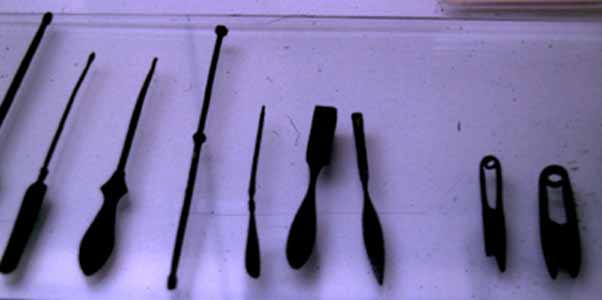
Instruments found
Scalpels, made of steel or bronze ) were used to make incisions. Scalpels could be made of either steel, bronze, or a combination of the two metals (such as a steel blade and a bronze handle).
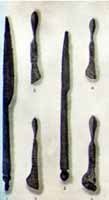 Ancient scalpels had almost the same form and function as their modern counterparts do today. The two long steel scalpels that make up the first and third columns of the accompanying image are examples of the most ordinary type of scalpel from antiquity. These long scalpels could be used to make a variety of incisions, but they seem to be particularly suited to making either deep or long cuts. The four bronze scalpels which make up columns two and four are generally referred to as "bellied scalpels." This variety of scalpel was another favorite of physicians in antiquity since the shape of its handle allowed more delicate and precise cuts to be made.
Ancient scalpels had almost the same form and function as their modern counterparts do today. The two long steel scalpels that make up the first and third columns of the accompanying image are examples of the most ordinary type of scalpel from antiquity. These long scalpels could be used to make a variety of incisions, but they seem to be particularly suited to making either deep or long cuts. The four bronze scalpels which make up columns two and four are generally referred to as "bellied scalpels." This variety of scalpel was another favorite of physicians in antiquity since the shape of its handle allowed more delicate and precise cuts to be made.
Hooks, long thin metal instruments were used as probes and the maneuvering small pieces of tissue more easily.
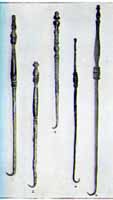
Hooks were another common instrument used regularly by Greek and Roman doctors. The hooks the ancient doctors used came in two basic varieties: sharp and blunt. Both of these types of hooks are still used by modern surgeons' for many of the same purposes for which the ancient doctors first used them. For instance, blunt hooks were primarily used as probes for dissection and for raising blood vessels. Sharp hooks, like those pictured in the accompanying image, were used to hold and lift small pieces of tissue so that they could be extracted and to retract the edges of wounds.
Bone drills, looking like wine cork screws were used to remove diseased bone tissue from the skull and extract sizable foreign objects such as a weapon from a bone.
- 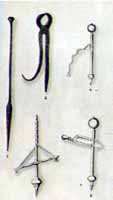 Bone forceps were used to extract small pieces of bone that would be otherwise difficult to remove with fingers.
Bone forceps were used to extract small pieces of bone that would be otherwise difficult to remove with fingers.
- Catheters, long metal tubes, like those we have today were used to help open up a blocked urinary tract infections.
- Bone Saw
- Vaginal speculum
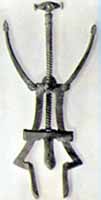
- Medicine box
- Rudimentary syringes
Other Surgical Tools
Besides the writings of Hippocrates, other writers wrote on medical topics. Aretaeus of Cappadocia described some acute and chronic diseases. Galen (130-200 AD) described many of the medical instruments used by both Roman and Greek doctors.
Around 325 AD Onbasius wrote an encyclopedia of medicine which was in a collection of 70 books.
Soranus of Ephesus wrote on obstetrics and gynecology.
Hospitals were only built for the military. A military hospital at Baden has produced a large collection of medical tools. A stone mural of Roman legion depicts a fellow solider helping another remove probably an arrow from his leg with a pair of pinchers. Some soldiers were skilled in medical while still serving in the army. The negative realm of Roman medicine started in its early history. Some practices were adopted from the Etruscans who helped found Rome.
Early Romans had a religious, yet semi-rational understanding of medicine. They believed that diseases were usually brought on by the disfavor of the gods. Since diseases soon or later went away they believed they had managed to please the gods by performing the correct religious acts. They didn't try to understand the reason or science behind the sicknesses. Religious cures were rare but magical treatment was common.
Bleeding cups, were used to take blood from a patient in a particular part of the body that was diseased. It was thought the removal of the blood would rid the body of the disease in that area.
The practice of reading livers was common in the Roman world. After an animal was sacrificed its liver was examined by a priest who would interpret the liver. Looking at the liver, the priest would reveal good or bad omens from it.
It was thought the gods responses were communicated through the liver and other internal organs of a sacrificed animal. Healing was sought after from religious temples. Sacrifices were made to gods in particular Asklepios in hopes of receiving healing.
Rome had two different types of physicians that aided the public.
The aristocrats had physicians as servants or visited the private physicians willing to pay their high prices. The other type were those who served the general public whose reputation wasn't as prestigious.
Many were illiterate, quacks, charlatans, and usually cheated the poor and needy.
Today, looking at the medical practices of the Romans, a doctor would probably cringe. Lack of sterile equipment, few if any painkillers, and doctors who worked off of superstitions would make anyone feel lucky to have the medical technology available to them today.
In many respects - the Romans laid the foundation of certain areas of modern medicine.

